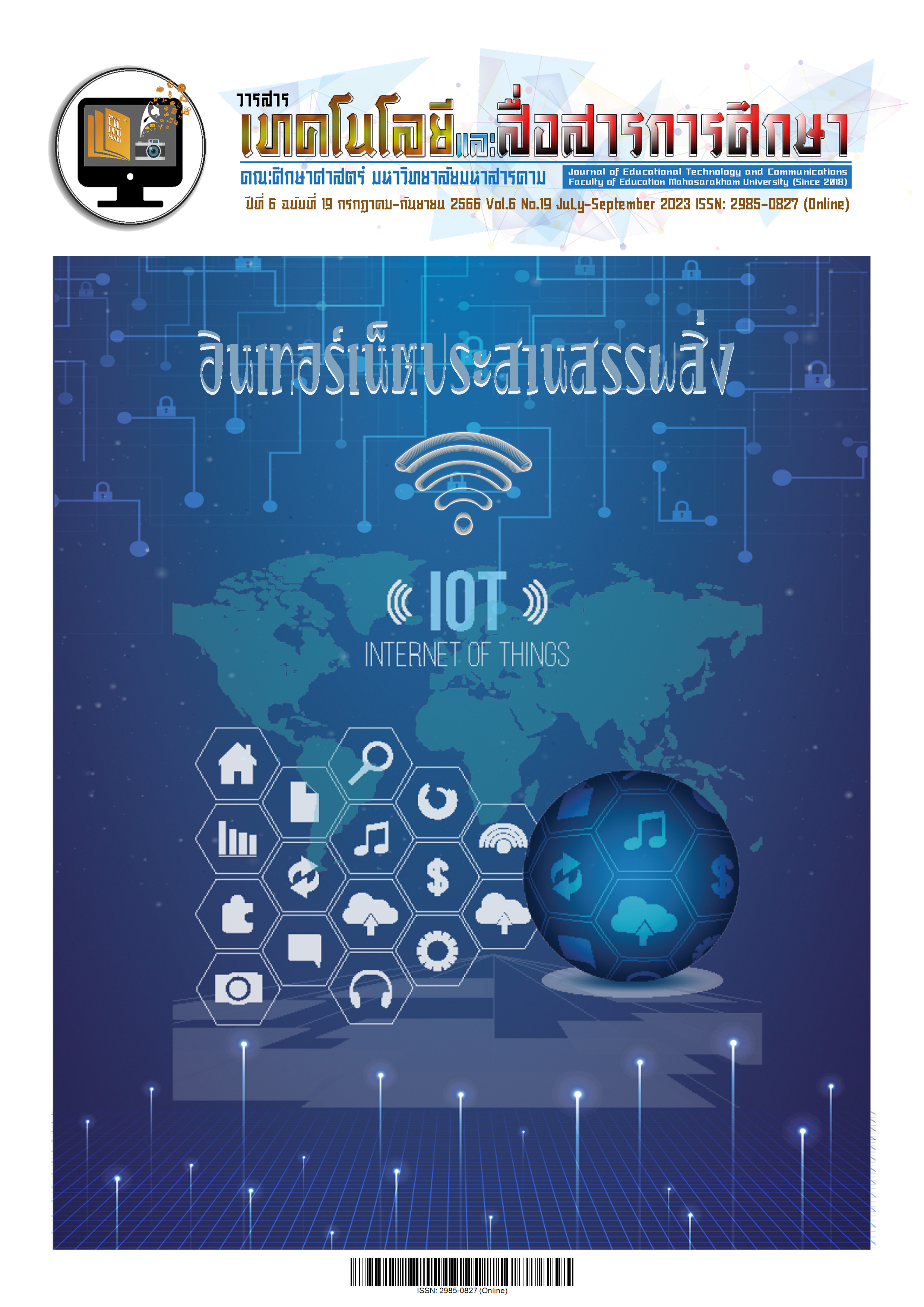The Development of Chinese Speaking Skill and Class Participation Using Scenario Based Learning for Grade 6 Students
Main Article Content
Abstract
The objectives of this research were to 1) compare the Chinese speaking skills of Grade 6 students before and after learning through Scenario-Based Learning, 2) compare the Chinese speaking skills of Grade 6 students after learning through Scenario-Based Learning with a determined criterion of 70%, and 3) examine the participation of Grade 6 students in learning through Scenario-Based Learning. The sample consisted of one classroom with 36 Grade 6 students from Phum Tawan Wittaya Foundation School, who were studying in the second semester of the academic year 2022, derived from cluster random sampling method. The research tools were composed of Chinese lesson plans utilizing Scenario-Based Learning, a Chinese speaking skill test, and an observation form for class participation. The statistics used in data analysis were mean, standard deviations, and t-tests.
The findings were as follows:
1) the Chinese speaking skills of Grade 6 students after learning through Scenario-Based Learning were statistically higher than before at .05 level of significance,
2) the Chinese speaking skills of Grade 6 students after learning through Scenario-Based Learning were different from the determined criterion of 70% but not statistically higher than the determined criterion of 70% at .05 level of significance,
3) the overall class participation of Grade 6 students in learning through Scenario-Based Learning was at a high level.
Downloads
Article Details
References
กระทรวงศึกษาธิการ. (2557). นโยบายการปฏิรูปการเรียนการสอนภาษาจีน. http://www.phatthalung2.go.th
จิตสุภา กิติผดุง. (2564). กิจกรรมการเรียนรู้แบบสถานการณ์เป็นฐาน ในการส่งเสริมความเป็นพลเมืองในระดับอุดมศึกษา.วารสารสันติศึกษาปริทรรศน์ มจร, 9(5), 2220-2229. https://so03.tci-thaijo.org/index.php/journal-peace/article/view/247249
ไชยฉัตร โรจน์พลทามล และสมพร โกมารทัต. (2562). การพัฒนาทักษะการสื่อสารภาษาจีนโดยใช้สถานการณ์เป็นฐานการเรียนรู้ของนักเรียนระดับประกาศนียบัตรวิชาชีพสาขาการท่องเที่ยวชั้นปีที่ 1. [วิทยานิพนธ์ปริญญา มหาบัณฑิต มหาวิทยาลัยธุรกิจบัณฑิตย์.] https://dric.nrct.go.th/Search/SearchDetail/309576
ธัญญารัตน์ มะลาศรี และ Wei Jingru. (2560). การจัดเรียนการสอนเพื่อพัฒนาทักษะการฟังและการพูดภาษาจีนสำหรับ ผู้เรียนชาวไทย. วารสารวิจัยราชภัฏกรุงเก่า, 4(3), 79-87. https://so03.tci-thaijo.org/index.php/IARJ/article/view/256336
ปนัดดา ปัตลา, วิทยา วรพันธุ์ และพัชนียา ยุระตา. (2563). การพัฒนาการมีส่วนร่วมในชั้นเรียนของนักเรียน ชั้นมัธยมศึกษาปีที่ 3/9 โดยการจัดการเรียนรู้แบบศูนย์การเรียนรู้ เรื่อง ดาราศาสตร์และอวกาศ. ใน วิทยา วรพันธุ์ (บ.ก.), การจัดการเทคโนโลยีและนวัตกรรม. การประชุมวิชาการระดับชาติการจัดการเทคโนโลยี และนวัตกรรม ครั้งที่ 6. (1-8), มหาวิทยาลัยราชภัฏมหาสารคาม.
เยาวลักษณ์ วิสุทธิ์สิริ, มนาภรณ์ บ้านเพิง และอัสมา ทรรศนะมีลาภ. (2564). การพัฒนาทักษะการพูดภาษาจีนโดยใช้กิจกรรมบทบาทสมมติกรณีศึกษาจากวิทยาลัยนานาชาติ วิทยาเขตสุราษฎร์ธานี มหาวิทยาลัยสงขลานครินทร์. วารสารครุศาสตร์อุตสาหกรรม, 20(3), 112-121 https://so06.tci-thaijo.org/index.php/umt-poly/article/view/256321
สาธิยา พันเทศ และไพทยา มีสัตย์. (2564). การพัฒนาความสามารถในการออกเสียงและการสื่อสารภาษาจีนโดยการเรียนรู้ด้วยสถานการณ์เป็นฐานของนักเรียนชั้นประถมศึกษาปีที่ 5. วารสารเทคโนโลยีและสื่อสารการศึกษา คณะศึกษาศาสตร์ มหาวิทยาลัยมหาสารคาม, 4(12), 52-66. https://so02.tci-thaijo.org/index.php/etcedumsujournal/article/view/249435
สิรวิชญ์ กมลทิพย์ และสุดคนึง นฤพนธ์จิรกุล. (2562). การพัฒนาทักษะการอ่านภาษาอังกฤษเพื่อความเข้าใจและพฤติกรรมการเรียนรู้แบบนำตนเองโดยใช้ชุดการเรียนรู้ภาษาอังกฤษออนไลน์สำหรับนักเรียนมัธยมศึกษาปีที่ 4. วารสารเทคโนโลยีและสื่อสารการศึกษา คณะศึกษาศาสตร์ มหาวิทยาลัยมหาสารคาม, 5(15), 141-152. https://so02.tci-thaijo.org/index.php/etcedumsujournal/article/view/256591
สุพรรณิการ์ วงค์สุตา. (2564). การพัฒนาทักษะการพูดภาษาจีนโดยใช้บทบาทสมมุติในวิชาการฟังและการพูดภาษาจีน 1 ของนักศึกษามหาวิทยาลัยราชภัฏลำปาง. มนุษยศาสตร์สังคมศาสตร์ปริทัศน์, 9(2), 59-70. http://www.human.lpru.ac.th/husocojs/index.php/HUSOCReview/article/view/230
อัญชลิการ์ ขันติ, สมเกียรติ อินทสิงห์ และสุนทรี คนเที่ยง. (2562). แนวทางการพัฒนาทักษะการพูดภาษาจีนเพื่อการสื่อสารเบื้องต้น. ศึกษาศาสตร์สาร, 3(1), 34-41. https://www.tci-thaijo.org/index.php/cmujedu/article/view/186726
Fao. (1994). Global Forest Resources Assessment. https://www.sciencedirect.com/science/article/pii/S0378112715003400
Fitz-Gibbon, C. T. & Morris, L. (1987). How to design a program evaluation. SAGE Publications.
Montgomery, K. (2002).Authentic Tasks and Rubrics: Going Beyond Traditional Assessments in College Teaching. ResearchGATE, 50(1), 34-40. http://doi.org/10.1080/87567550209595870
Oller, J. W. (1979). Language Test at School. A Pragmatic Approach. Longman Inc.
Pearson, K. (1920). Notes on the history of correlation. Biometrika, 13(1), 25-45. https://doi.org/10.2307/2331722


